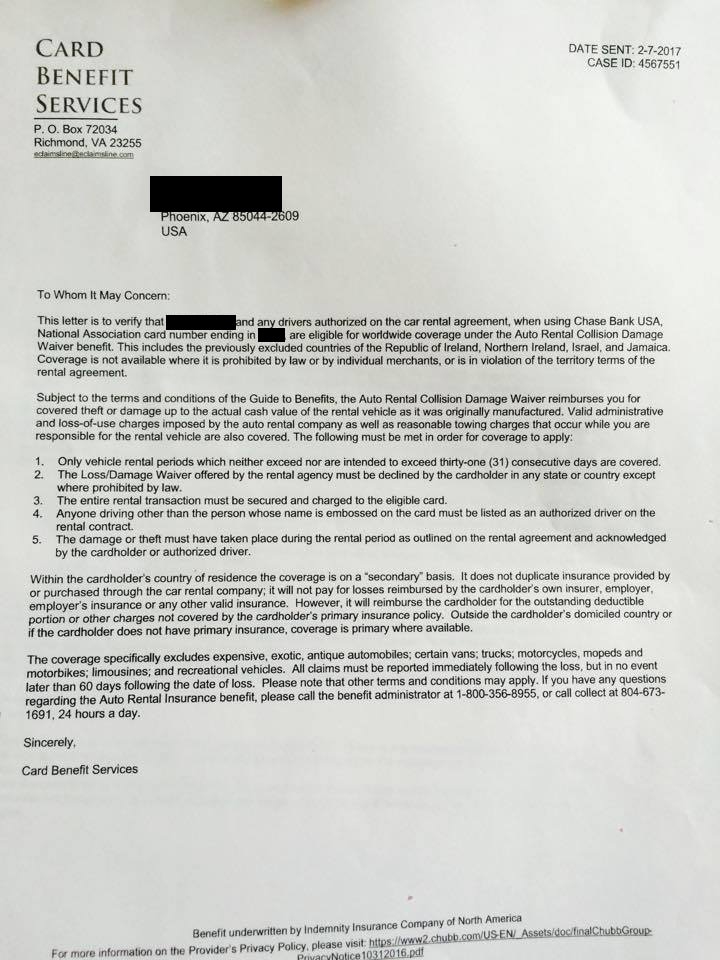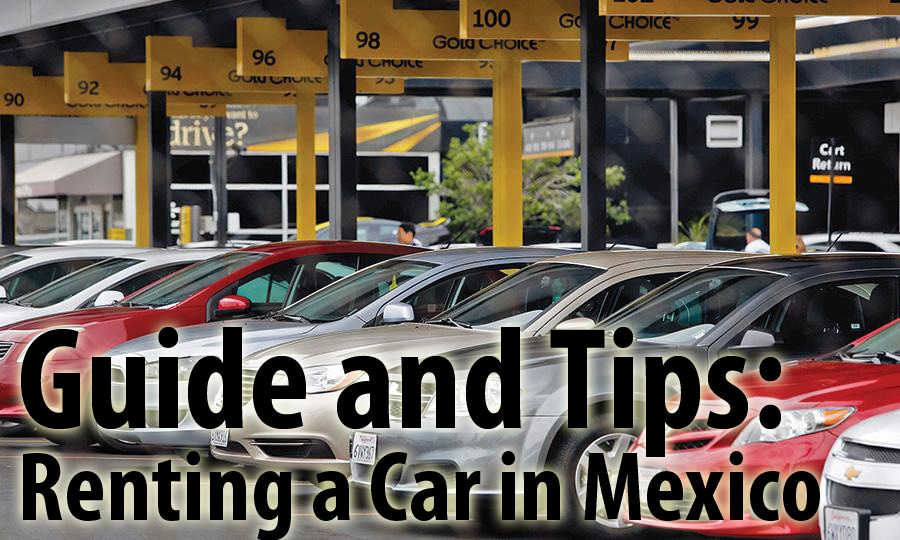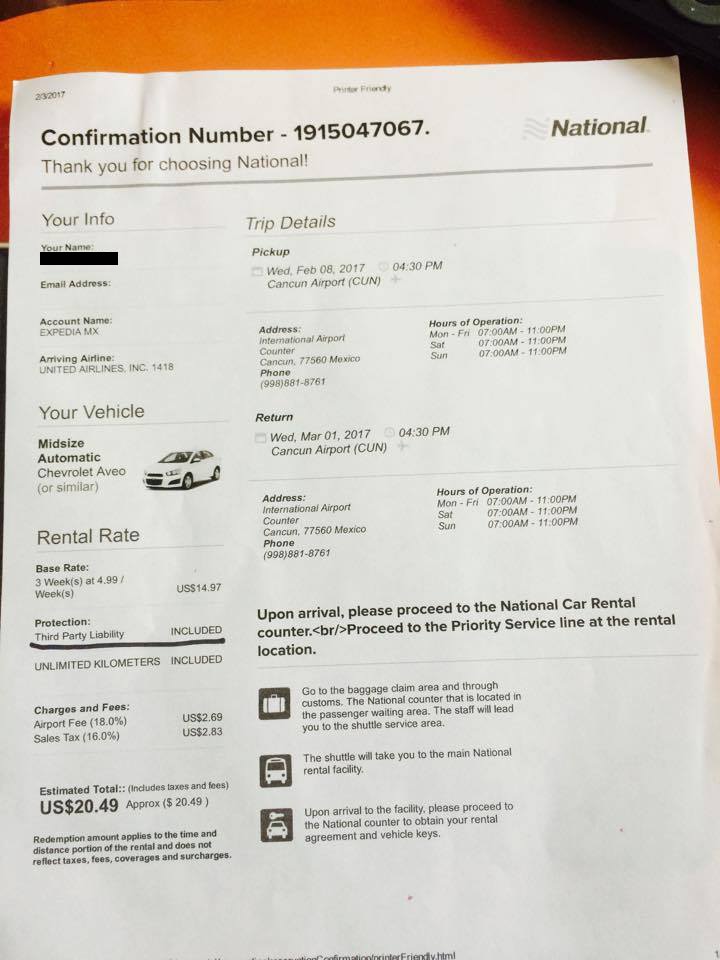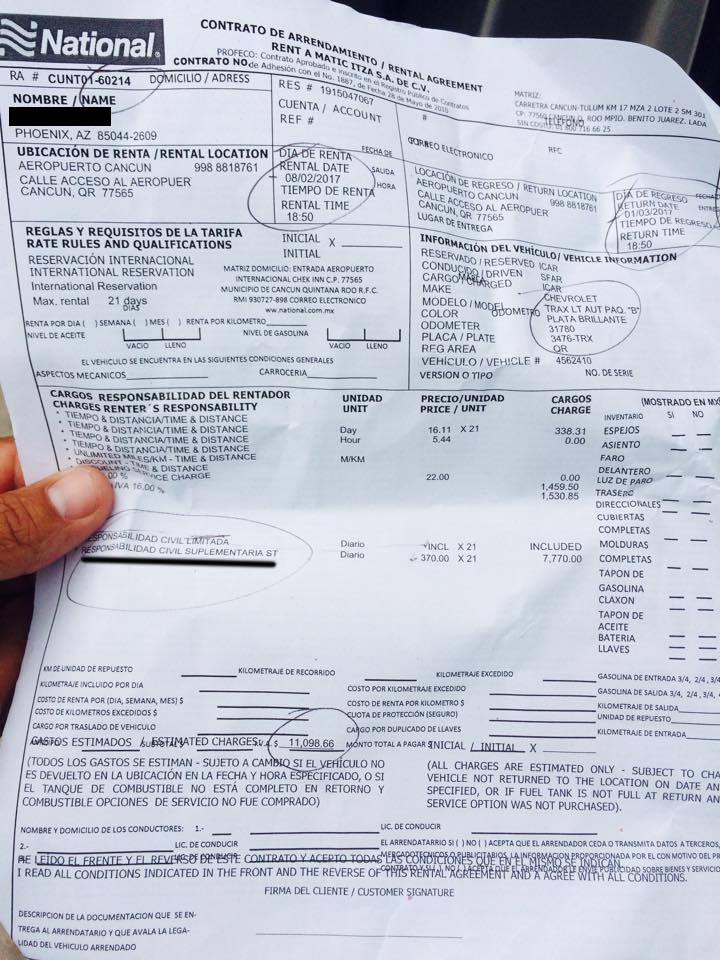Option 2: Rental car with liability coverage through a Mexican insurance company = approx. $20-30 USD/day
Tip #1: Never Buy Car Insurance Online
Yes, we do know that websites like Expedia and Kayak will display rental cars for $1 / day, however, these
are offers pre-car insurance and are what have lead many a tourist to start off their Mexico adventure with a
headache, lots of stress, and feelings of having just been ripped off. Why? Because none of the insurance
offers online through websites like Expedia or Kayak will be honored in Mexico. If you did purchase car
insurance, online you will be forced to buy Mexican insurance separately in Mexico once you arrive.
Tip #2 : Purchase Car Insurance After Arriving in Mexico
Go ahead and reserve your car online, often times for just $1-2 per day, just do not purchase your car
insurance online at the same time or the money will be wasted. Instead, once you arrive in Mexico and pick
up your vehicle, simply purchase the insurance coverage that is right for you directly through the car rental
company. If the online website offers free liability, that is OK, just do not pay extra for any sort of car
insurance.
Tip #3: Save Money by Renting from a Carrier Not Located at the Cancun International Airport
OK. So this is not absolutely necessary, but if you book a rental through an agency not located at the Cancun
International Airport you will save by avoiding a 16-18% “airport tax” on your rental. Rental agencies that are
offsite will come pick you up at the airport in a shuttle and take you to their place of business. It simple to do
but does add a small amount of transit time before getting your rental car.
Tip #4: Take Cell Phone Pictures of the Car and Check the Spare Tire
While no ComeKiteWithUs clients have had any issues returning rental cars in Cancun, there are plenty of
Trip Advisor reviews for most rental agencies complaining about being charged for damage to the car that
was already present upon rental. If you take pictures of the car and any damage, then you can prove that the
car already had a dent or scrape prior to your travels in Mexico. Additionally, check to make sure the spare
tire is in the car and that the rim is not damaged. Some reviews by Trip Advisor users mentioned getting
charged for missing spare tires, or for replacing a rim that was damaged, even though they had never
touched the spare tire. It is important to note that some people claimed the rim was damaged on the bottom
side that was not visible at the time of rental, but when they returned the car the spare was removed and the
damage discovered. Be as diligent as you see fit, although, as mentioned above, none of our clients have
had issues in this area.
Tip #5: Drive the Speed Limit in Mexico
Here is the deal; we have driven on a daily basis in Mexico and have never been harassed or had the police
stop us for a “speeding ticket” and ask for a payout / bribe. That being said, we always drive the speed limit
and ignore cars that may be passing us while hurrying on their way. We know for a fact that when a Mexican
local or taxi driver gets pulled over for speeding, they will likely pay the cop 200 pesos and then be let go;
however, if you are a gringo or US citizen, typically you will be asked to pay a “fine” in the $100-200 USD
range.
So, don’t speed even a little. In fact, when in doubt keep your speed under the speed limit and you
should be fine. If you are pulled over driving slower than the speed limit, calmly and with confidence tell the
officer you were in no way driving faster than the speed limit and that you refuse to pay a fine for speeding.
Insist they take you to the police station if necessary (they won’t, they just want money). Most likely if you
are pulled over for speeding they will have a radar gun when they are legitimately catching speeders, so if
you really were speeding get out your wallet.
Note: On the way in and out of Cancun there are almost always cops with radar guns hidden along the 180,
catching speeding motorists, so be careful and go the speed limit to insure you don’t have to bribe a cop
before heading to El Cuyo for your kite vacation.
Everything You Need to Know About Option 1:
Option 1 is getting a rental car with full coverage through a Mexican insurance company and typically costs
approximately $40-60 USD / day. Book your car online and do not buy insurance at that time. When you get
to Mexico you can buy full coverage through the rental agency. One client of ours who used Enterprise paid
$41/day for 3 days. Another client used Easy Way Car Rental (a Mexico rental company) and paid $470
USD for 7 days, which is $67/day (ouch!) and this client did rent from an offsite company so there is no airport
tax in that day rate. Note: Both examples include all taxes and fees in the final day price.
As you can see the prices for a car with full coverage can vary drastically. Do your homework to keep from
having any surprises or sticker shock when you get to Mexico. Expect full coverage to cost you at least $40
USD. Having a car worry free in Mexico is certainly worth it for many people, so do what feels best for you.
Option 2 is getting a rental car with liability coverage only through a Mexican insurance company, and using
credit card secondary insurance as the additional coverage. To do this, book your car online and do not buy
insurance at that time unless liability is included. When you get to Mexico and find yourself at the rental car
agency’s desk, they will likely tell you that you cannot use the credit card secondary insurance, and as such,
will try to up-sell you to full coverage. What this means is that you need to be ready with all paperwork in
hand to ensure they will honor your secondary insurance policy.You should have copies on hand of the following documents with you:
- A copy of the credit card benefits that explicitly states any car you will drive, rented using that credit card,
is covered under the secondary insurance policy. Make sure that the secondary insurance is “worldwide”
coverage. See attached picture.

attached picture.
get, at the minimum, a verbal confirmation that your credit card’s secondary insurance will be honored in
Mexico, along with a phone number to call from Mexico should you run into issues with the rental agency
accepting it. (note: You may not have cell service at the Cancun airport, nor will there be an open network for
calling out.) Even better, ask if they will send you an email or letter in the mail on official letterhead with the
confirmation that your credit card’s secondary insurance will be honored. You can use this letter as leverage,
should the rental agency pressure you or try to convince you to buy full coverage.Another thing to take note of is that regardless of IF the rental agency will accept the secondary insurance
policy, there will be some sort of comprehensive insurance they will require you purchase (it will be called
“Responsibilidad Civil Suplementaria” see attached picture.) but should cost somewhere in the range of 350-
400 pesos per day ($15-20 USD).
insurance, using the above documentation upon arrive, ended up paying $24 USD per day for a 21 day
rental.The last thing to note is that using a credit card’s secondary insurance means that you will need to pay for
any damage to your rental car when you return it and the credit card company will reimburse you at a later
time. This means that the car rental agency will require a credit card or cash deposit on the rental. For some
rental agencies the deposit is a signed but blank credit card receipt, while others require a credit card hold or
cash deposit that can range anywhere between $400 and $12,000 USD. Because of this last headache, for
many, full coverage (Option 1) is the headache free method for renting a car in Mexico.
Tip #6: Stand Your Ground
If you are planning to use Option 2 and have followed all the advice if this blog and have all your paper work
in order and a assurance from the rental agency’s corporate headquarters that your secondary insurance will
be accepted, stand your ground if you are experiencing resistence. This might sound like a headache, but
the agents working at the rental agency are used to foreign tourists giving way to their aggressive sales
techniques when it comes to forcing people to buy full insurance coverage. A little time, a raised voice, and
holding up the line will insisting they honor the policies of the parent corporation can go a long way. We can’t
guarantee arguing will work every time, but it has worked for many of our clients.For more information on car insurance in Mexico, follow the link below.
Frequently Asked Mexican Insurance Coverage Questions:
www.mexpro.com/mexico/faqcoverage.htmlTip #7: Gassing Up Your Rental Car
One common and unfortunate experience for the unwary tourist gassing up their rental car is the 500 to 50 pesos swap scam. I have read about it happening to many people, and it was attempted on a client of ours. Here is how it goes. You stop to fill up the tank in your rental. A full tank will cost 700 pesos or more, so you hand the attendant a 500 pesos bill with some other bills to cover the fill-up. The attendant turns around for a slip second, then spins back around to you and says “You hand me wrong amount. You only hand me 50 pesos instead of 500.” The attendant will now be holding a 50 pesos bill in their hand, instead of your 500. Granted, the two bills are the same color, so many tourists think they handed the wrong amount to the attendant, and thus hand over 500 pesos more. To avoid this scam be sure to follow this recommendations:
- Don’t hold a wad of cash in your other hand, instead count out all money as soon as the tank stops filling and only have the money you owe for filling up visible.
- Make eye contact with the attendant and hand them the money, bill by bill, counting the cash out to them.
- Make a comment as you hand over the 500 pesos, such as “Gasolina es muy cara, si?” (gasoline is very expensive, yes?)
- If they try the scam on you and you are 100% positive you gave them 500 pesos and not 50 pesos, stand your ground and ask to talk to the manager. With our client, the attendant backed down and took the original amount of pesos handed to them.
Source: http://www.comekitewithus.com/



